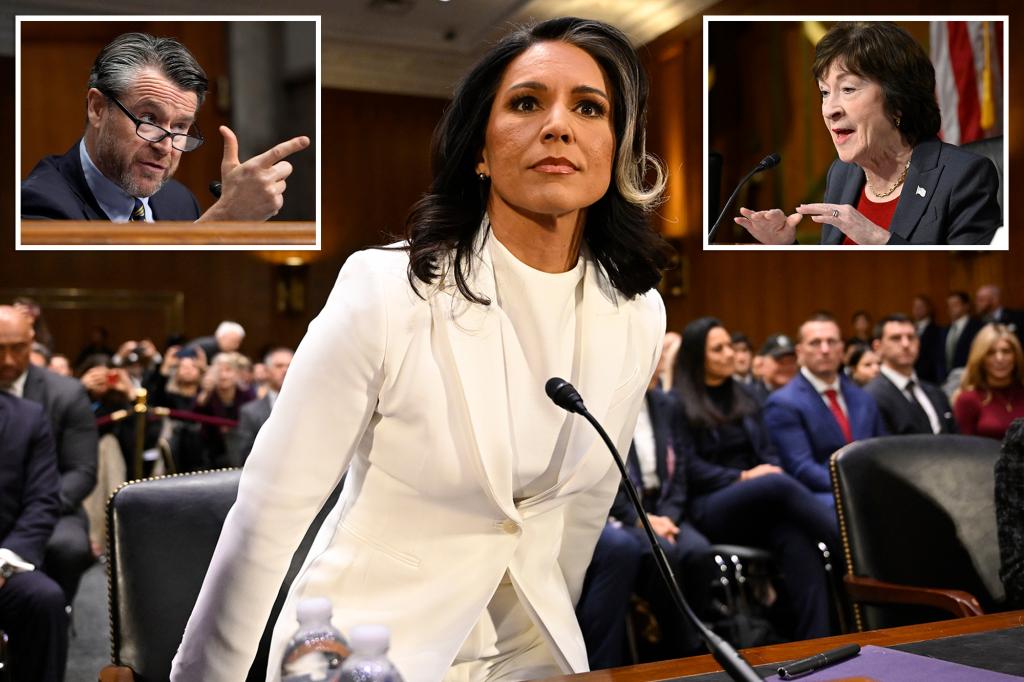Tulsi Gabbard’s nomination for Director of National Intelligence (DNI) has successfully navigated its first major hurdle, securing approval from the Senate Intelligence Committee, paving the way for a full Senate vote later this month. The committee’s decision, reached behind closed doors, reflects a stark partisan divide, with nine Republicans endorsing Gabbard and eight Democrats opposing her. This close margin underscores the contentious nature of her candidacy and the challenges she faces in securing the necessary support for confirmation. Gabbard requires at least 50 votes in the full Senate, meaning she can afford to lose no more than three Republican votes if all Democrats vote against her. Her nomination has sparked significant controversy due to her past pronouncements and positions, particularly concerning the intelligence community and national security issues.
Gabbard’s confirmation hearing last week provided a forum for senators to publicly scrutinize her past viewpoints and express their reservations. Several Republican members, initially skeptical about her nomination, rigorously questioned her previous stance on issues such as the Syrian civil war and the actions of Bashar al-Assad. Gabbard’s prior skepticism regarding the intelligence community’s assessment of Assad’s use of chemical weapons against his own people became a focal point during the hearing, with senators seeking clarification and reassurances about her commitment to accepting intelligence assessments. Furthermore, her past support for Edward Snowden, the former NSA contractor who leaked classified information, drew considerable attention. Senators pressed Gabbard to unequivocally condemn Snowden’s actions and acknowledge the damage caused to national security.
Despite initial misgivings, key Republican senators, including Todd Young and Susan Collins, signaled their support for Gabbard’s nomination following the hearing. Senator Young, who had previously expressed concerns about Gabbard’s perception within the Intelligence Committee, announced his intention to back her nomination after receiving assurances regarding her commitment to supporting intelligence professionals and ensuring unbiased information for policymakers. Senator Collins praised Gabbard’s plans to streamline the Office of the Director of National Intelligence, indicating a positive assessment of her proposed approach to the role. Senator James Lankford, also initially hesitant, joined the ranks of Gabbard supporters, further solidifying her chances of securing the nomination.
While gaining crucial Republican support, Gabbard faced considerable opposition from Democratic senators who voiced skepticism about her suitability for the DNI position. The majority of Democrats on the committee expressed concerns about her past stances on national security issues and her abrupt shifts in policy positions. During the confirmation hearing, Gabbard attempted to address these concerns, explaining her evolving views on sensitive topics such as the Foreign Intelligence Surveillance Act (FISA) Section 702, a controversial provision authorizing surveillance of non-U.S. citizens abroad. Gabbard, who had previously criticized and sought to repeal this authority, now affirmed its importance for national security capabilities. She also addressed her controversial 2017 meeting with Syrian dictator Bashar al-Assad, claiming she had directly confronted him about his regime’s human rights abuses and the use of chemical weapons.
Despite the contentious nature of the confirmation process, Senate Intelligence Committee Chairman Tom Cotton, a Republican known for his hawkish views on foreign policy, emphasized that Gabbard’s FBI background check had yielded no red flags. He highlighted the importance of accurate and unbiased intelligence to inform policy decisions and prevent costly failures like the invasion of Iraq, which he attributed to faulty intelligence. Cotton’s support for Gabbard, coupled with her ability to sway some initially hesitant Republican senators, demonstrates a strategic approach by Republicans to install an individual who they believe will prioritize unbiased intelligence assessments.
Gabbard’s nomination highlights the ongoing politicization surrounding intelligence matters. Gabbard, who switched her party affiliation from Democrat to Republican and endorsed Donald Trump just last year, framed her nomination as a mandate from the American people to “break this cycle of failure” and “end the weaponization/politicization of the [intelligence community].” Her rhetoric directly aligns with criticisms leveled by Trump and his allies who accuse the intelligence community of bias and political motivations. This context underscores the political stakes associated with her nomination and suggests that her leadership, if confirmed, could bring significant changes to the intelligence community’s relationship with the political establishment. The potentially divisive impact of her appointment reinforces the need for the intelligence community to maintain its independence and resist political pressures to ensure objectivity and the integrity of its assessments.

